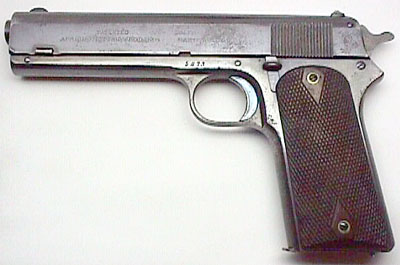
Model 1905 serial number 5473 - A very unique Model
1905 with an interesting history. The pistol is inscribed
"Col. John Caswell" on the back strap and is complete with
the original holster. The Colt Factory Letter indicates
that this pistol was a one gun shipment shipped on July
11, 1911 to Von Lengerke & Detmold, 349 Madison
Avenue, New York, NY. The history behind this gun is that
it was special ordered by Col. Caswell to take on an African
safari. While on the safari, his hunting party was attacked
by natives and Caswell had to use this Model 1905 to defend
himself. He was so disturbed by what transpired that when he
returned to the States, he eventually gave the gun to a
friend of his who was the president of a bank in South
Carolina. The gun remained in the same family for more than
two generations.
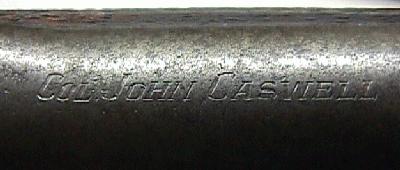
Inscription on Back strap
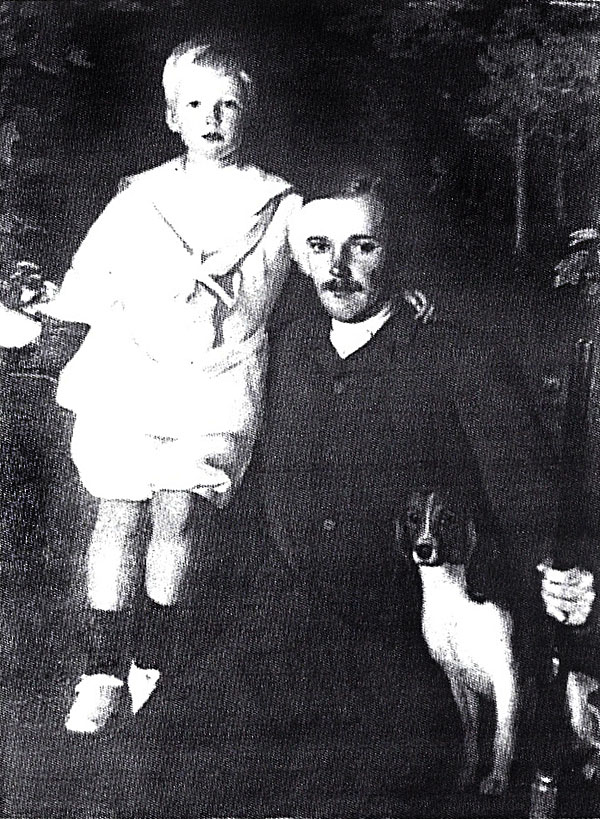
Col. John Caswell, John Caswell, Jr. &
"Dainty" by Charles Hopkinson (ca. 1907) - image courtesy of
Brad Caswell.
Col. John Caswell (Dr. William
Halsted7, John6, William5, John4, Job3, Thomas2, Thomas1)
born 16 Jan. 1873, New York, NY, married 12 Sept. 1894,
Beverly, MA, Gertrude Robbins, born 31 May 1870, Lynn, MA,
(daughter of Royal Elisha Robbins and Mary Elizabeth
Horton), died 1951, Boston, MA. John died 8 Feb. 1935 at the
home of his aunt, Mrs. Wesley Watson, in Cadgan Gardens,
London, England, buried Woodlawn Cemetery, Bronx, NY.
Col. John Caswell's personal notes provided much of the
information for his family. At least some of the notes were
made within the last 5 years of his life as he mentions the
birth of his brother's granddaughter, Virginia Lee Caswell,
in 1930. He notes that he was baptized in haste at the age
of one week. Being only 5 lbs. in weight he was thought to
be too weak to survive. His obituary is paraphrased below.
John spent three years at Harvard College
and one year at Harvard Law School. During much of his life
he made his home at Prides Crossing, MA, and served in the
state's militia and the Federal Officers Reserve Corps. He
attained the rank of colonel, chief of ordnance, in the
Massachusetts militia. Before the US entered World War I,
Colonel Caswell served as an ambulance driver in France in
an American volunteer unit with the French Army and in 1915
he presented an ambulance to the unit. Later he was a major
of ordnance with the American Expeditionary Force.
The lure of big game hunting twice took him to Africa where
his kill included several world records. Trophies of his
hunts can be seen in the American Museum of Natural History,
New York, the Agassiz Museum at Harvard, and the St. Mark's
School in Southborough, MA. He was interested in the study
of small arms ballistics and the use of military and
sporting rifles. His book SPORTING RIFLES AND RIFLE
SHOOTING is ranked among the authoritative works on
the subject.
Children:
i John Caswell Jr. born 10 Feb. 1898.
ii Elizabeth Robbins Caswell born 9 Aug. 1901, Beverly, MA,
married Sept. 1923, John Mitchell, (son of Walter Mitchell).
She married (2) before 1954, Robert B. Choate who died 1966.
Elizabeth died 3 Aug. 1987. She was living in Locust, NJ
with her first husband in 1931. She was living in Danvers,
MA in 1954 and at the time of her death.
The following obituary appears in the April,
1935 issue of American Rifleman magazine:
A host of riflemen will learn with regret of
the death of Colonel John Caswell on February 9th, after a
five-months' illness. Colonel Caswell died in London but was
buried in Woodlawn Cemetery, in New York. He was sixty-two
years old. Colonel Caswell was one of the most generous
riflemen ever associated with the National Rifle
Association. He was a member not only of the National Rifle
Association of America, but also of the Dominion of Canada
Rifle Association and the National Rifle Association of
Great Britain. His gifts of money and trophies and his
contribution of technical advice were always generous. He
was commissioned Colonel and Inspector General of Small Arms
Practice on the staff of the Commander-in-Chief for the
Commonwealth of Massachusetts on August 31, 1907, and
shortly after that was commissioned colonel and Chief of
Ordnance in the Ordnance Department of that state. In 1915
he served as an ambulance driver with one of the American
volunteer units attached to the French Army, and later
purchased and presented an ambulance to that unit. He
returned to the United States to instruct the first
Plattsburg camp in small arms marksmanship in 1916. When the
United States entered the war, Colonel Caswell was
commissioned a Major of Ordnance in the A.E.F. Trophies from
his African hunting expeditions are now located in the
American Museum of Natural History, at New York, the Agassiz
Museum at Harvard University and at St. Marks School, which
Colonel Caswell attended in his youth. He was probably best
known to the present generation of riflemen through his
book, "The Sporting Rifle," and through the Caswell Trophy,
which is one of the most important of the several National
Small Bore Trophies competed for annually at Camp Perry. The
game has lost one of its finest sportsmen. John Caswell has
answered the last muster.
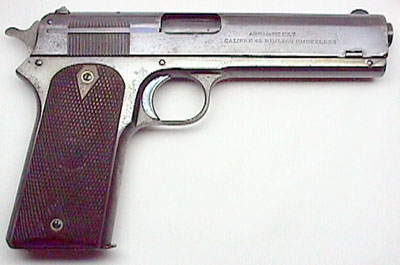
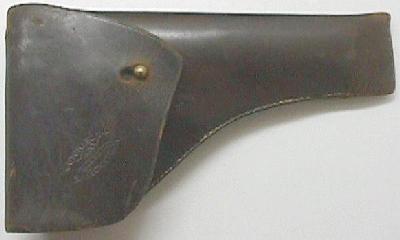
The original holster for Col. Caswell's Model 1905.
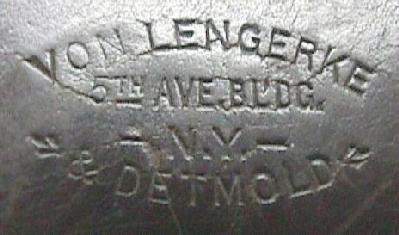
Holster is marked on the flap "Von Lengerke
& Detmold, 5th Ave. Bldg., N.Y." |